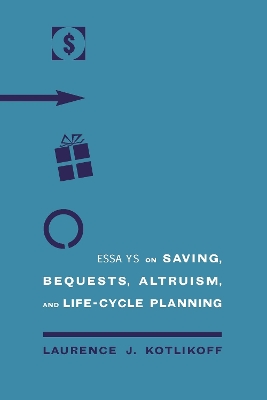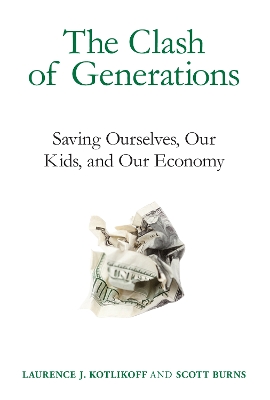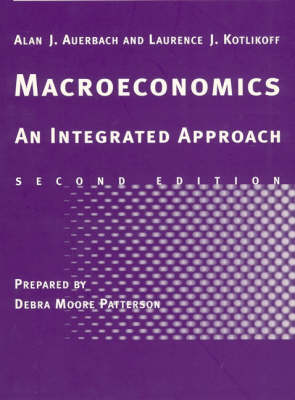The MIT Press
6 total works
Many undergraduate texts treat macroeconomics as a set of distinct topics rather than as a unified body of theory and empirical findings. In contrast, this text by Alan Auerbach and Laurence Kotlikoff uses a single analytic framework -- the two-period life-cycle model -- to explore and connect each of the major issues in contemporary macroeconomics. The model describes the evolution of the economy over time in terms of the behavior of overlapping generations of individuals, each of whom lives for two periods: youth and old age. This versatile framework can encompass most macroeconomic schools of thought through the alteration of key assumptions. The use of one basic model also allows the authors to explore important topics not always addressed adequately in other texts; these include credit constraints, real business cycles, generational accounting, and international capital flows markets.
Written in a clear, accessible style, this shortened and simplified second edition provides a systematic way to interpret macroeconomic outcomes, to understand various policy proposals, and to appreciate how individuals and firms fit into the big picture.
Fiscal policies, such as unfunded social security, can dramatically alter a country's wealth, although the process can take many years. Unfortunately, Kotlikoff observes, official fiscal deficits are intrinsically unreliable for measuring the government's stance of fiscal policy. He also concludes that the baby busts currently underway in the United States, Europe and Japan are likely to improve overall economic welfare despite their detrimental impacts on social security systems.
Essays on Saving, Bequests, Altruism, and Life-cycle Planning
by Laurence J. Kotlikoff
This collection of essays, coauthored with other distinguished economists, offers new perspectives on saving, intergenerational economic ties, retirement planning, and the distribution of wealth. The book links life-cycle microeconomic behavior to important macroeconomic outcomes, including the roughly 50 percent postwar decline in America's rate of saving and its increasing wealth inequality. The book traces these outcomes to the government's five-decade-long policy of transferring, in the form of annuities, ever larger sums from young savers to old spenders. The book presents new theoretical and empirical analyses of altruism that rule out the possibility that private intergenerational transfers have offset those by the government.While rational life-cycle behavior can explain broad economic outcomes, the book also shows that a significant minority of households fail to make coherent life-cycle saving and insurance decisions. These mistakes are compounded by reliance on conventional financial planning tools, which the book compares with Economic Security Planner (ESPlanner), a new life-cycle financial planning software program. The application of ESPlanner to U.S. data indicates that most Americans approaching retirement age are saving at much lower rates than they should be, given potential major cuts in Social Security benefits.
How America went bankrupt and how we can save ourselves-as a country and as individuals-from economic disaster.
The United States is bankrupt, flat broke. Thanks to accounting that would make Enron blush, America's insolvency goes far beyond what our leaders are disclosing. The United States is a fiscal basket case, in worse shape than the notoriously bailed-out countries of Greece, Ireland, and others. How did this happen? InThe Clash of Generations, experts Laurence Kotlikoff and Scott Burns document our six-decade, off-balance-sheet, unsustainable financing scheme. They explain how we have balanced our longer lives on the backs of our (relatively few) children. At the same time, we've been on a consumption spree, saving and investing less than nothing. And that's not to mention the evisceration of the middle class and a financial system that has proven it can't be trusted. Kotlikoff and Burns outline grassroots strategies for saving ourselves-and especially our children-from what could be a truly catastrophic financial collapse.
Kotlikoff and Burns sounded the alarm in their widely acclaimedThe Coming Generational Storm, but politicians didn't listen. Now the need for action is even more urgent. It's up to us to demand radical reform of our tax system, our healthcare system, and our Social Security system, and to insist on better paths to investment return than those provided by Wall Street (mis)managers. Kotlikoff and Burns's "Purple Plans" (so called because they will appeal to both Republicans and Democrats) have been endorsed by a who's who of economists and offer a new way forward; and their revolutionary investment strategy for individuals replaces the idea of financial capital with "life decision capital."
Of course, we won't be doing all this just for ourselves. We need to fix America's fiscal mess before our kids inherit it.
https://www.youtube.com/watch?v=IMKw76lBn0k&feature=youtube_gdata_player
Study Guide to Accompany Macroeconomics
by Alan J. Auerbach and Laurence J. Kotlikoff
prepared by Debra Moore Patterson





